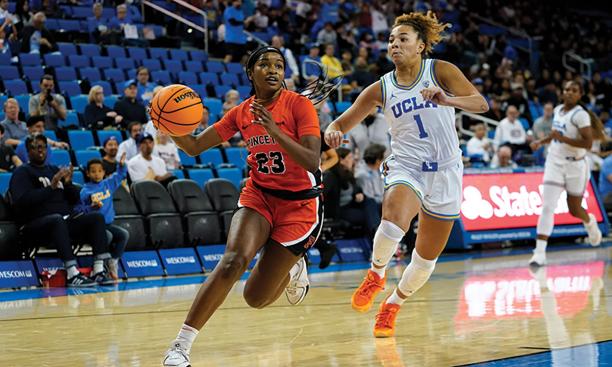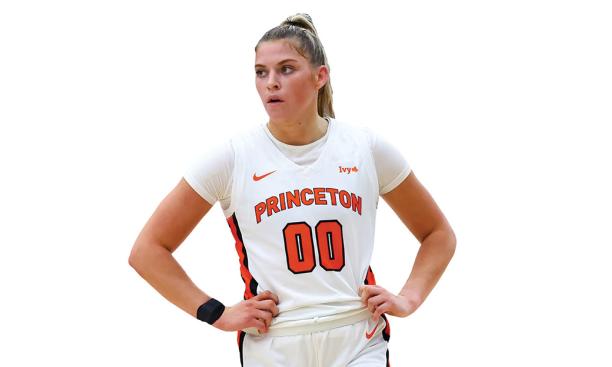
Princeton women’s basketball gained national attention over Thanksgiving weekend when it split games against top-25 teams Oklahoma and Indiana. The 77-63 victory over Oklahoma gave the Tigers their fourth win over a ranked opponent in program history and vaulted them into the AP poll at No. 25.
But those games arguably weren’t even the toughest on Princeton’s nonconference schedule, which also featured a game at then-No. 3 UCLA. Overall, the Tigers had six games against Power Six teams before conference play. That tied for the most in the Ivy League this season and was the most for Princeton since head coach Carla Berube arrived in 2019.
“This is probably the most challenging schedule since I’ve been here,” said assistant coach Lauren Battista, who is in charge of scheduling. “But … if we want to be great, we gotta keep raising the bar.”
Every year, Berube uses the nonconference slate to prepare her team for the Ivy League, which she considers the most important part of the season. In the Ancient Eight, there is little margin for error — as Princeton saw last year in losing its first two conference games before winning the next 12 to capture its fifth straight regular-season title — and players face challenging road trips and back-to-back games.
Playing Power Six teams also helps preview what an NCAA Tournament matchup might look like. “We’ve felt that, these past two seasons in particular where we’ve had success in March, it’s because we’ve played some of those top teams early on,” Battista said. “That exposed us to … that level of athleticism and size and environment that you end up seeing when you get to March.”
Berube also tries to schedule games near players’ hometowns. This season, those have included the UCLA trip for guard Kaitlyn Chen ’24 and a game at Middle Tennessee State (MTSU) for guard Amelia Osgood ’25.
But Battista and the Tigers face a catch-22 with scheduling: As they’ve had success in the NCAA Tournament, including first-round wins over Kentucky in 2022 and North Carolina State in 2023, it’s gotten harder to schedule the kinds of games that prepare them to succeed in March. Power-conference teams sometimes hesitate to play a mid-major that could beat them, and fellow mid-majors sometimes want a more winnable game.
“Teams are like, ‘No thanks. Call me in a couple years,’” Berube said.
Battista added, “When you do find those opponents that are willing … it’s like hitting the jackpot.”
Building the schedule, then, requires lots of “trial and error.” Battista calls, texts, and emails coaches to find games, and there are also websites where coaches can post and look for a match. After finding a willing opponent, the next hurdle is determining a date. There’s also the goal of minimizing missed class time for Princeton’s players.
Battista’s efforts have paid off: A young Princeton roster has learned from every challenge, starting with a 14-point comeback against MTSU on Nov. 12 and a near-upset of UCLA on Nov. 17.
“After we lost to UCLA by only three points, we knew that we were right with these teams and it didn’t even matter about the rankings,” guard Madison St. Rose ’26 said.
Another takeaway for St. Rose was that the players could’ve focused on the scouting report “just a little bit more.” They did that against Oklahoma, which gave them even more confidence that they belonged with the nation’s best.
“This is what we’ve been saying,” Berube said after that game, “is that just because we’re mid-major doesn’t mean we can’t compete with your Power Fives and your top 25s. … It’s a big win for the team and the program and I think for the Ivy League as well.”

“We’re kind of the underdog here and that’s exciting. It’s nothing to lose, play with a chip on your shoulder. ... I think, honestly, we play better.”
— Ellie Mitchell ’24
Forward
Princeton has relied heavily on returning starters Chen, St. Rose, and Ellie Mitchell ’24 this season. Against Oklahoma, Chen and St. Rose combined for 44 points and Mitchell collected 18 rebounds. But Berube has also leaned on freshmen: Starting guard Skye Belker ’27 was the difference against MTSU and in a double-overtime win over Seton Hall on Nov. 29, scoring 18 points in each game.
Seton Hall, Villanova, and Rutgers are all nearby power-conference teams that have historically been successful. Playing them helps reduce travel for the Tigers, who logged about 9,500 miles in nonconference play alone, while keeping their strength of schedule high.
After the Seton Hall win, Berube said she’d learned throughout the season that her players “are resilient, they’re gritty, and they’re tough. And they love playing together; they love coming to work every day. … And that we’re in every game, no matter what.”
With a nonconference schedule that is this challenging, Princeton also gets to take on a role it often plays in the NCAA Tournament but almost never does in the Ivy League.
“We’re kind of the underdog here and that’s exciting,” Mitchell said after the Indiana game. “It’s nothing to lose, play with a chip on your shoulder. So … we like these big games. … I think, honestly, we play better.”
Princeton wasn’t the only Ivy League team to challenge itself in nonconference play: The Ivies played 25 games against Power Six teams, the most since at least 2014-15. “When you know your team has it, you know you need to test them in different ways,” said former Princeton assistant and current Columbia head coach Megan Griffith.
Those early-season tests should make for an exciting, highly competitive conference season, and they will only help teams like Princeton in March.
